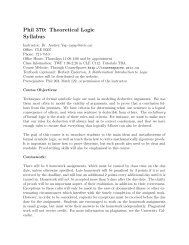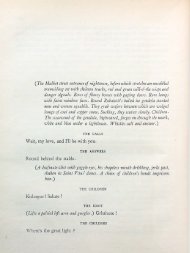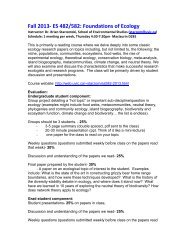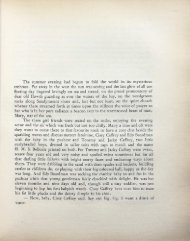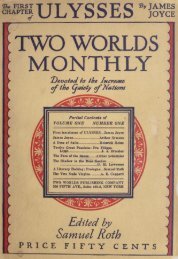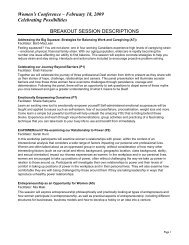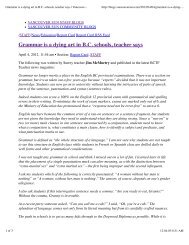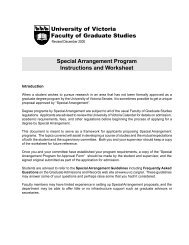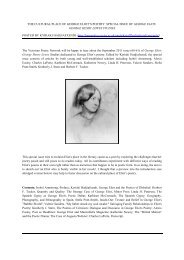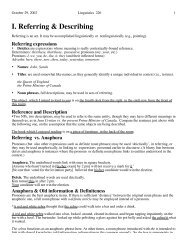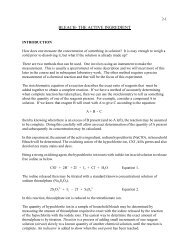Response Paper — Hamlet
Response Paper — Hamlet
Response Paper — Hamlet
You also want an ePaper? Increase the reach of your titles
YUMPU automatically turns print PDFs into web optimized ePapers that Google loves.
<strong>Response</strong> <strong>Paper</strong> <strong>—</strong> <strong>Hamlet</strong><br />
In a paper of no more than 500 words, write a response to one of the following questions.<br />
Double-space, number each page, and include a word count at the end of your paper.<br />
Richard van Oort<br />
ENGL 366B<br />
If you have not read the FAQs for the response papers, please do so. The FAQs can be found at<br />
the course website (http://web.uvic.ca/~rvanoort/engl366.html).<br />
1. The ghost is a key character in the play. But you have to be careful with ghosts. They’re not<br />
always very reliable. What do you make of this one? Is he an “honest” ghost? Or is he rather<br />
a “goblin damned”? Who sees the ghost? Who hears him? Why doesn’t the ghost cut to the<br />
chase and appear to <strong>Hamlet</strong> first? Why begin by hovering ominously but silently in front of<br />
a few guards and Horatio?<br />
2. Why are the guards so anxious at the beginning before they see the ghost? Horatio is<br />
accompanying Bernardo and Marcellus to witness “this thing.” Many people consider<br />
Horatio to fulfill the role of the skeptic; thus the fact that he also witnesses the ghost gives<br />
credibility to the guards’ story. But take another look at the scene and ask yourself if this<br />
theory makes sense. Is Horatio a detached observer? What is his interest in these events?<br />
What exactly is he doing in Denmark? And why is he so very well informed about Danish<br />
history? The more you think about Horatio, the more puzzling he becomes.<br />
3. Who is the central figure of 1.2? How would you stage this scene? To whom are <strong>Hamlet</strong>’s<br />
first words addressed? To himself, to Claudius, or to the court? Why? And why does the<br />
king take such a long time to get around to acknowledging <strong>Hamlet</strong>?<br />
4. What irritates <strong>Hamlet</strong> in 1.2? Toward whom is his resentment directed? Look closely at<br />
<strong>Hamlet</strong>’s first soliloquy: “Oh, that this too too sullied flesh” (1.2.29-58).<br />
5. What is the point of 1.3? Why does Laertes warn Ophelia away from <strong>Hamlet</strong>? Look closely<br />
at the language he uses. Why is <strong>Hamlet</strong> associated here with “contagious<br />
blastments” (1.3.42)?<br />
6. Take another look at <strong>Hamlet</strong>’s first encounter with the ghost in 1.4. Why does he react the<br />
way he does? Why does the ghost lead him away from the others? Why does <strong>Hamlet</strong><br />
threaten Horatio and Marcellus? Consider what the ghost says to <strong>Hamlet</strong>. What are these<br />
“foul crimes” he speaks of? What are these “secrets of his prison house”? Why is this so<br />
horrible and terrible? To what exactly is the ghost referring?<br />
7. The ghost goes on to say: “The serpent that did sting thy father’s life / Now wears his<br />
crown” (1.5.40-41). Note <strong>Hamlet</strong>’s response: “Oh, my prophetic soul!” (1.5.42). What’s<br />
prophetic about <strong>Hamlet</strong>’s soul? Did <strong>Hamlet</strong> already suspect the crime? Why? Was there any<br />
evidence for it? Does the ghost itself constitute evidence?<br />
1
8. The ghost says “Brief let me be” and then goes on for another 30 lines ranting about the<br />
royal bed of Denmark being a couch for luxury and damned incest. Where have we heard<br />
this kind of vituperative language before? Who else imagines the queen’s bed in this way?<br />
Could this be significant?<br />
9. We know <strong>Hamlet</strong> has a knack for conversing with ghosts, or at least with this ghost (he<br />
succeeds where Bernardo, Marcellus, and Horatio have failed). But what about plays? He<br />
seems to have a thing for these too. Certainly, the high point for <strong>Hamlet</strong> coincides with the<br />
arrival of the players. He seems buoyant and jubilant, released from his normal suspicion<br />
and paranoia. Why? And why does he have the player king recite the speech about Pyrrhus<br />
(2.2.465-518)? Take a closer look at the imagery of the speech. What so excites <strong>Hamlet</strong><br />
here?<br />
10. Almost immediately after the player’s Pyrrhus speech, <strong>Hamlet</strong> delivers his third major<br />
soliloquy (“Oh, what a rogue and peasant slave am I!” [2.2.550]). What exactly is <strong>Hamlet</strong> so<br />
upset about? Is it the fact that he hasn’t avenged his father yet? But it doesn’t seem quite that<br />
simple. He’s wondering why he, the son of a murdered father, can’t seem to summon the<br />
same passion as the player, who has just made it all up. But even more, he seems to be upset<br />
that nobody is listening to his story. He wants to “amaze indeed / The very faculties of eyes<br />
and ears” (2.2.564-64). So he decides to put on a play. “The play’s the thing” (2.2.605). (The<br />
thing? Remember Horatio: “What, has this thing appeared again tonight?” [1.1.25]). Most<br />
people think that the “Mousetrap” play is <strong>Hamlet</strong>’s way of determining Claudius’s guilt so<br />
that <strong>Hamlet</strong> can deliver justice with a clear conscience. <strong>Hamlet</strong> even says: “I have heard /<br />
That guilty creatures sitting at a play. . . have proclaimed their malefactions” (2.2.590-94).<br />
<strong>Hamlet</strong> is looking for a reaction alright. And he certainly is looking for signs of guilt in<br />
Claudius. But does he want justice? Or to put the same question differently, if he wants<br />
justice, why does he put on a play? And why does he insist on keeping Claudius’s crime a<br />
secret?<br />
11. Fast forward to the play scene (3.2). This is a complicated scene and difficult to read<br />
because of all the things happening on stage. But you really need to imagine it unfolding in<br />
your mind. It’s too easy to say, “Oh, yeah, I get it. Claudius sees the ear-poisoning thing and<br />
gives the whole game away. Now <strong>Hamlet</strong> has his motive and cue for passion.” Before you<br />
can make that argument you need to consider this question: Why doesn’t Claudius react to<br />
the dumbshow? Why does it take a retelling of the same story this time with all sorts of<br />
interjections from <strong>Hamlet</strong> himself to get a reaction from the king? And what exactly does<br />
<strong>Hamlet</strong> say about this one Lucianus who comes to murder the king? Now ask yourself what<br />
Claudius is reacting to. Consider also the difference between our view of this scene and the<br />
onstage audience’s view of this scene. What do they think Claudius is reacting to? And<br />
where does this leave us with respect to the question of Claudius’s guilt? It’s almost as if<br />
<strong>Hamlet</strong> wants Claudius to think the way he thinks. Incidentally, how did Claudius murder<br />
his brother? Ear poisoning seems like a pretty unique murder method, one rich with<br />
narrative implications. (Think of that other ear-poisoner, Iago.) And where did <strong>Hamlet</strong> get<br />
the idea of ear poisoning. (Don’t say he got it from the ghost. Why should we trust that<br />
thing?)<br />
2
12. The “To be or not to be” speech (3.1.57-90) is <strong>Hamlet</strong>’s fourth major soliloquy. What is it<br />
about? Is it really just about suicide? <strong>Hamlet</strong> seems to be working with a couple of<br />
oppositions that fold one into another. The first is being and not being (which could map<br />
onto living and dying, but need not). He seems to be referring to action versus inaction.<br />
Should he arm himself against a sea of troubles? Should he kill Claudius? Will that achieve<br />
“being,” greatness, and immortality? (Remember Henry V.) <strong>Hamlet</strong> seems to be saying that<br />
being (in the center) is great, but it’s also a lot of bloody work and you usually die trying<br />
(like “brave York” in Henry V). So perhaps it’s better to grunt and sweat under a weary life<br />
(a life of being on the periphery, which is, of course, the same as not being: nobody notices<br />
a nobody). Anyway, reread this speech. It’s suffused with resentment, which shouldn’t<br />
surprise us.<br />
13. After the “To be or not to be speech,” <strong>Hamlet</strong> encounters Ophelia. She has been “planted”<br />
there by Claudius and Polonius who wish to test Polonius’s theory that the cause of <strong>Hamlet</strong>’s<br />
melancholy is his (thwarted) desire for Ophelia. <strong>Hamlet</strong> begins civilly enough, but he<br />
quickly unleashes a torrent of invective on the poor girl. Defenders of <strong>Hamlet</strong> cling to<br />
Polonius’s theory like a life raft. <strong>Hamlet</strong> is upset because Ophelia has rejected him. She is<br />
now adding insult to injury by returning his “remembrances.” The poor man must be beside<br />
himself! But seriously, who rejects whom? What evidence is there to suggest that Ophelia<br />
has the upper hand in this relationship? Why does <strong>Hamlet</strong> enter her “closet” (2.1.79) take<br />
her by the wrist, peruse her face, raise “a sign so piteous and profound” (2.1.98), and then<br />
walk slowly away from while staring at her fixedly? Is he acting? Is he sincere? Is it possible<br />
that Ophelia represents a part of <strong>Hamlet</strong> that is slowly being killed off by him? Why do you<br />
think this scene takes place directly after the “To be or not to be” speech?<br />
14. Compare <strong>Hamlet</strong> and Claudius in the prayer scene (3.3). Does <strong>Hamlet</strong> overhear Claudius?<br />
That seems unlikely given that the stage direction says that <strong>Hamlet</strong> enters after Claudius has<br />
uttered his soliloquy. Why doesn’t <strong>Hamlet</strong> kill Claudius? He says that he doesn’t want to<br />
send Claudius to heaven. Is that the only reason? Could <strong>Hamlet</strong> be using this reason as an<br />
excuse? Consider also the iconography of the scene. A defenseless may praying while<br />
another stands behind him with sword raised to kill. Where do your sympathies lie? Is<br />
Claudius sincere in his attempt to pray?<br />
15. The “closet” scene. Tons of Freud has been heaped on this scene. But you can see why. The<br />
language is bordering on the pornographic. “Nay, but to live / In the rank sweat of an<br />
enseaméd bed, / Stewed in corruption, honeying and making love / Over the nasty<br />
sty!” (3.4.93-96). Why is <strong>Hamlet</strong> so obsessed with this particular image of Claudius and<br />
Gertrude? Is this how you imagine your parents, even if one of them might be a step-parent?<br />
What so upsets <strong>Hamlet</strong> about his mother? Freud thought he was acting like the jilted lover.<br />
Is that plausible? And why does <strong>Hamlet</strong> insist on showing her the two portraits? Does the<br />
gentleman protest too much? What do you think the two brothers would look like side by<br />
side? Would they appear so very different?<br />
16. Why does the rabble cry “Laertes shall be king!”? Are we covertly being invited to make a<br />
comparison between <strong>Hamlet</strong> and Laertes? Come to think of it, <strong>Hamlet</strong> and Laertes are a bit<br />
3
like brothers. But their trajectories are the inverse of one another. Laertes leaves but <strong>Hamlet</strong><br />
stays. Is Laertes a contender for the throne? Is <strong>Hamlet</strong>? What about young Fortinbras?<br />
Somewhat ironic, isn’t it? After losing it all thanks to a winner-take-all contest with old man<br />
<strong>Hamlet</strong>, the loser’s son has it virtually handed back to him on a plate thanks to all the<br />
intrigue and back-stabbing taking place in the Danish court.<br />
17. Why does <strong>Hamlet</strong> leap into the grave with Laertes? He protests that he loved Ophelia more<br />
than Laertes ever did. How seriously can we take <strong>Hamlet</strong> at this point? How many times in<br />
the play has <strong>Hamlet</strong> confessed his love for Ophelia before this moment? But if <strong>Hamlet</strong> is<br />
merely acting or ranting about love, then what motivates his rant? Is he imitating Laertes?<br />
But why would he want to do that?<br />
18. The closing lines of the play are given to Fortinbras, who says that had <strong>Hamlet</strong> lived to<br />
become king who would “have proved most royal” (5.2.400). Would <strong>Hamlet</strong> have been a<br />
good king? What evidence is there to suggest that he would have been better than Claudius?<br />
What evidence is there to suggest that he would have been worse?<br />
4



